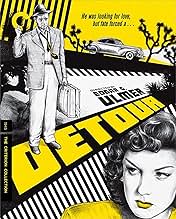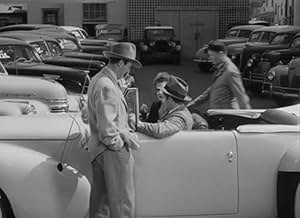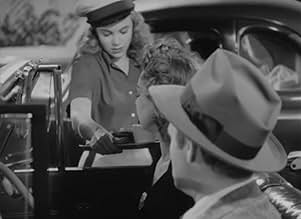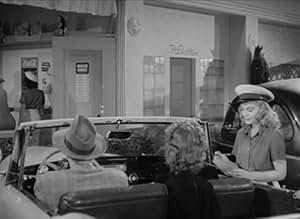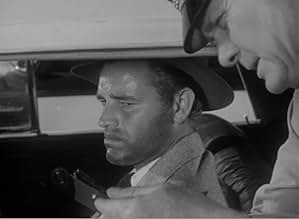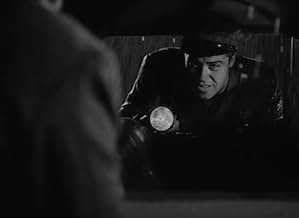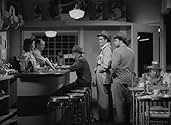Aggiungi una trama nella tua linguaThe life of Al Roberts, a pianist in a New York nightclub, turns into a nightmare when he decides to hitchhike to Los Angeles to visit his girlfriend.The life of Al Roberts, a pianist in a New York nightclub, turns into a nightmare when he decides to hitchhike to Los Angeles to visit his girlfriend.The life of Al Roberts, a pianist in a New York nightclub, turns into a nightmare when he decides to hitchhike to Los Angeles to visit his girlfriend.
- Premi
- 1 vittoria in totale
- Used Car Salesman
- (non citato nei titoli originali)
- Cop
- (non citato nei titoli originali)
- Tony - Used-Car Lot Mechanic Inspecting Car
- (non citato nei titoli originali)
- Nightclub Patron
- (non citato nei titoli originali)
- California Border Patrolman
- (non citato nei titoli originali)
Recensioni in evidenza
The characters in "Double Indemnity," "Body Heat," or "The Talented Mr. Ripley" do not think of themselves as bad people. They believe they are forced into their crimes by the world, which is the essential difference between crime movies and noir. As pointed out by Roger Ebert: "the bad guys in crime movies know they're bad and want to be, while a noir hero thinks he's a good guy who has been ambushed by life."
"Detour" is told through the central character, Al Roberts, who recalls his story as one made through impossible coincidences and horrible luck. But there is something not right about his story. The audience can pick out the incongruities and flaws as soon as they're told. Was Charles Haskell's death really the result of bad luck or simply a murderer trying to convince himself that it was? We wonder if it is possible that a person as innocent as Al says he is can be forced into such immoral activities. However, the explanation is quite clear. Al is retelling the story not as a true confession but as a man reviewing his defense to the police.
Watching the movie, I was reminded of Tanazaki's "The Key," a novel in which the main character deliberately lies to the audience as a way of reaching the story's conclusion. We do not see a real conclusion to "Detour," but we sense that the police will find the same flaws in Al's story as we do. And that is not a fatal form of story-telling but a way of looking into the mind of a true noir character and seeing the darker depths of his soul. That is why film noir is so haunting and why this movie is so definitive in its genre.
The acting and much of the dialogue is very melodramatic, bordering upon soapy, but it fits the story as so much of it involves conveying the emotion and doing so from the point of view of Al. Bogart and Mitchum wouldn't have been right for this lead role. Either one of them would have come across as either too cool or too tough to put up with such a domineering femme fatale as Ann Savage's Vera and seem so depressed and pathetic. Instead, Tom Neal is perfect as a guy who sees himself bound by fate and doomed.
But maybe the entirety of the story is made up. Al's voice over could just be him sitting in the cafe creating an alibi story. Ann Savage's performance as Vera was over the top maybe because it's Al telling the story, and he wants to make himself look good. I don't buy half of what he tells us; I think he was much more complicit in all of the deaths than he wants the audience to believe. Vera is a caricature of the noir femme fatale because he's trying to convince us that everything was her idea or an accident or fate based on his act of true love - trying to get to his girl in California - and he's completely innocent.
On the technical side, this one showed a great use of light, shadows, and music, and fine direction by Ulmer to keep the mood. It's too bad nobody has restored this one as it resides in the public domain. This is one noir that will stay with you.
It moves in a seamless manner. The narrator is drawn as we watch into further and further degradation.
The movie has a beautiful look. I'm sure it's a cliché to note this but it resembles a Hopper painting. It also bears the trademarks of Edgar Ulmer's movies: Literate dialogue and classical movie, no matter how low the budget.
Tom Neal is a mournful, appealing protagonist. He's weak, not really bad. Ann Savage, of course, is terrifying as Vera, the hitchhiker from everyone's worst nightmare.
Al's descent from blonde soubrette Sue to consumptive, murderous Vera is terrifying. Yet, though it passes by us quickly, it is fully believable.
"Detour" is a true work of art.
Lo sapevi?
- QuizWhile the crew was setting up to film a hitchhiking scene, a passing car tried to pick up Ann Savage (made up to look dirty and disheveled), causing the crew to break out laughing.
- BlooperIn the first shots of Al hitchhiking, the film is reversed. The cars are driving on the wrong side of the highway and the drivers sitting behind the wheel are sitting on the right side of their vehicles.
- Citazioni
Al Roberts: Money. You know what that is, the stuff you never have enough of. Little green things with George Washington's picture that men slave for, commit crimes for, die for. It's the stuff that has caused more trouble in the world than anything else we ever invented, simply because there's too little of it.
- ConnessioniEdited into Michael Jackson's This Is It (2009)
- Colonne sonoreI Can't Believe That You're in Love with Me
(uncredited)
Written by Jimmy McHugh and Clarence Gaskill
Performed by Claudia Drake
Played often in the score
I più visti
Dettagli
- Data di uscita
- Paese di origine
- Siti ufficiali
- Lingua
- Celebre anche come
- Detour: Deviazione per l'inferno
- Luoghi delle riprese
- Virginia Street, Reno, Nevada, Stati Uniti(In rear projection shot in opening scene, the Reno Arch is seen through the car's rear window.)
- Azienda produttrice
- Vedi altri crediti dell’azienda su IMDbPro
Botteghino
- Budget
- 30.000 USD (previsto)
- Lordo Stati Uniti e Canada
- 16.172 USD
- Fine settimana di apertura Stati Uniti e Canada
- 5127 USD
- 2 dic 2018
- Lordo in tutto il mondo
- 16.172 USD
- Tempo di esecuzione1 ora 6 minuti
- Colore
- Proporzioni
- 1.37 : 1
Contribuisci a questa pagina


![Guarda Trailer [OV]](https://m.media-amazon.com/images/M/MV5BZGEyYTUwNDQtN2ZjZi00YmY2LWE2ZjUtOTY3NjQ3NDQ0Zjg3XkEyXkFqcGdeQXRyYW5zY29kZS13b3JrZmxvdw@@._V1_QL75_UX500_CR0)
